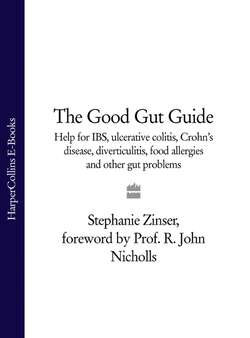Читать книгу The Good Gut Guide: Help for IBS, Ulcerative Colitis, Crohn's Disease, Diverticulitis, Food Allergies and Other Gut Problems - Stephanie Zinser - Страница 34
What Causes It?
ОглавлениеAbdominal pain is probably the one symptom that has the widest range of possible causes. These include period pains, excess alcohol, stress, overuse of aspirin and food intolerance. Abdominal pain can also be caused by problems that aren’t related to the gut – like the sexually-transmitted disease chlamydia, or by ovarian cysts or ovarian cancer, or even by adhesions. Abdominal pain is a common symptom of gut infections and infestations such as viral gastroenteritis, parasitic infections, food poisoning, gastritis, typhoid and paratyphoid. It can also be caused by inflammatory conditions including proctitis, Crohn’s disease, diverticulitis, appendicitis and peritonitis. And various other problems may lead to abdominal pain of varying degrees and locations – anal abscesses, hernias, peptic ulcers, malabsorption, IBS, bowel and gastric cancer, and intestinal obstruction.
Pain sensations are caused when pain receptors (special nerve endings found throughout the body) are activated. They are usually triggered by pressure on the nerve endings – for example, the sharp pressure of an injury or the dull pressure of an increase in blood flow or fluid retention. The receptors then send electrical impulses travelling along our nerves to the brain, where they are interpreted as pain. Because the distribution of pain receptors is highly uneven throughout the body, certain pains are felt more distinctly than others. For example, there are probably more pain receptors on the tongue alone than there are throughout the rest of the digestive tract combined.
